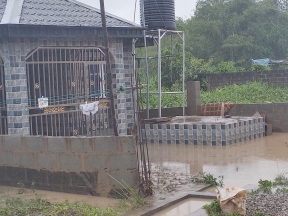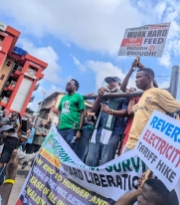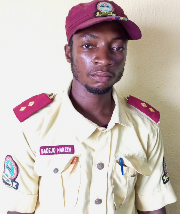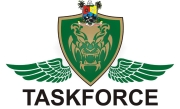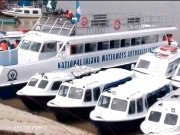
Sanwo-Olu assures of efficient, accessible water transportation in Lagos
By Abimbola Joseph
CITIZENS COMPASS—Lagos State Governor, Mr Babajide Olusola Sanwo-Olu, on Wednesday, assured Lagosians of his readiness and resolute commitment to create a future where ferry transportation is efficient, accessible, safe and sustainable for everyone.
Sanwoolu gave the assurance at the 2025 Regional Ferry Safety Conference in the State.
The Conference was themed, “Charting Safer Waters: Advancing Ferry Safety Through Innovation, Collaboration, and Integrated Transport Solutions.”
The governor was represented by his deputy, Dr Obafemi Hamzat, who stressed the urgent need for enforceable safety frameworks, cutting-edge technology adoption, and harmonised operational standards to secure ferry users across the region.
He said, “This conference is not merely timely; it is essential. In a state like ours, with over 25 million residents, the need for a robust ferry transportation system for urban mobility, tourism, and economic connectivity is undeniable.
“However, as we embrace this growth, we must simultaneously uphold rigorous, enforceable, and technologically advanced safety standards.
“This calls for a unified regional effort, and we are ready to lead the charge,” he said.
According to him, Lagos has made substantial investments in modern jetties, ferry terminals, cutting-edge digital monitoring systems, and comprehensive capacity-building initiatives—all aimed at safeguarding our citizens.
He said Lagos State Waterways Authority(LASWA), has deployed patrol and rescue boats, equipped services with state-of-the-art safety gear, and established the first-ever Inland Waterways Monitoring and Data Management Centre.
The Deputy Governor said the state has also implemented stricter operational guidelines and introduced the locally-built Omi Bus standard ferries to enhance their regional capabilities.
“However, we must recognize that ferry safety transcends local boundaries; it is a regional imperative. “This is precisely why today’s gathering is critical,” he said.
He urged the National Inland Waterways (NIWA) to stop issuing licences for sandfillings on the waterway because its killing Lagos.”Let our water breathe,” he said.
Earlier, Dr. Paul Adalikwu, Secretary-General of the Maritime Organization of West and Central Africa (MOWCA) called for regional partnership and underscored the devastating impacts of ferry accidents in the sub-region.
He referenced the 2023 Esther Miracle ferry disaster in Gabon, which claimed over 300 lives, as a tragic reminder of the need for urgent reforms.
Adalikwu disclosed that following that incident, MOWCA, in collaboration with the Government of Gabon and the International Maritime Organization (IMO), developed the Libreville Plan of action meant for shaping the current regional discourse on ferry safety.
He charged participants to contribute actively, noting that the solutions to the region’s ferry safety challenges lie in collective experiences and shared wisdom.
“We must ensure that ferry transport is not only efficient and accessible but, above all, safe.
“Our discussions here will build on the Libreville Action Plan to set clear, actionable safety benchmarks for the entire region,” Adalikwu said.
He said the decision to hold the conference in Lagos was a recognition of the state’s model achievements in ferry operations and safety.
“Lagos is a cosmopolitan city operating a multi-modal transport system with about 60,000 daily ferry commuters.
“The robust framework put in place by the Lagos State Waterways Authority (LASWA) is a shining example of how ferry operations can be made safer and more attractive,” he said.
In his remarks, the General Manager, LASWA, Mr Damilola Emmanuel, reinforced the need for cross-border policy harmonization and stronger technical standards to ensure that ferry transport becomes a dependable and environmentally sustainable mode of transportation throughout Africa.
He echoed the Governor’s commitment, emphasizing the need for policy harmonization, stronger technical standards, and innovative safety practices to ensure ferry transport becomes a dependable and environmentally sustainable mode of transportation across Africa.
“We are here to forge a safer, more resilient future for ferry transport across Africa’s waterways,” Emmanuel said. “We must harness innovation, real-time data, and advanced vessel technologies to protect lives and position ferry transport as a key driver in Africa’s blue economy.”
Also speaking, Lagos State Commissioner for Transportation, Mr. Oluwaseun Osiyemi, described maritime safety as a continuous journey that demands vigilance, collaboration, and urgent action. He emphasized that ferry incidents in any part of the sub-region must be seen as a shared concern.
“Ferry incidents anywhere in our region resonate with us all.
“Our ambition must be to ensure that every passenger, whether in Lagos, Lomé, Accra, or Dakar, boards a ferry with confidence, knowing that robust systems and a safety-first culture are in place,” Osiyemi said.
He commended LASWA for its leadership in advancing ferry safety and thanked MOWCA and INTERFERRY for their partnership in driving regional collaboration.
Also speaking, the Managing Director of the National Inland Waterways Authority (NIWA), Mr. Bola Oyebamiji, emphasized the role of NIWA in promoting safer and more efficient inland water transportation across Nigeria.
He said that NIWA is working closely with partners such as NASO, Agro-Water, and the Maritime Workers Union of Nigeria to enhance safety standards, improve emergency response protocols, and promote sustainable practices in water transport.
She urged stakeholders to continue working together to build safer and more sustainable waterways that will benefit not only the passengers but also the communities that depend on water transport.
Oyebamiji, represented by Mrs Elsie Egwuatu, Head of Marine, NIWA, said it aligns perfectly with NIWA’s commitment to providing safe, seamless, and affordable transportation.
“As we gather to discuss ferry safety, we are reminded of the critical importance of ensuring the well-being of passengers and crew on our inland waterways,” she said. “
“At NIWA, we believe ferry safety is a shared responsibility that requires the collective efforts of all stakeholders.”
“Our collaborative efforts aim to minimize risks, prevent accidents, and ensure that our waterways remain a safe and reliable mode of transportation for all,” she said.
“We are committed to enhancing safety protocols and regulations, promoting innovation and technology adoption, and developing integrated transport solutions that prioritize safety and sustainability.”

